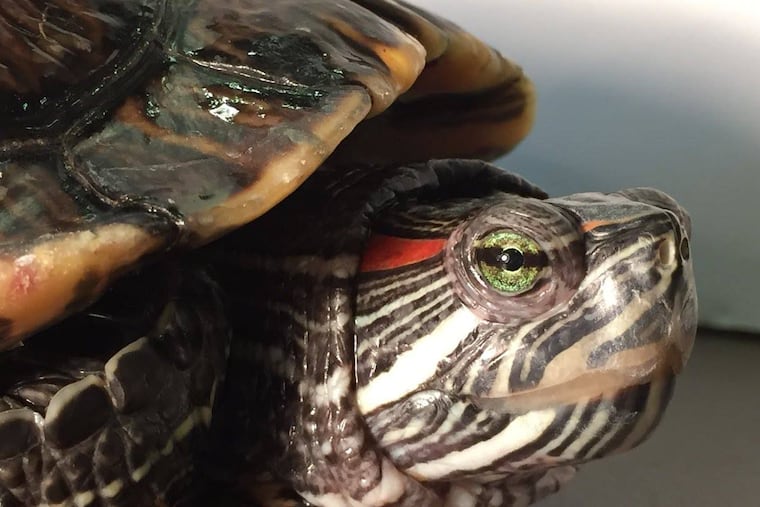Turtles sold by roadside sellers have sickened eight in Philly area with salmonella. One person has died.
You might not think that cute little pet could kill you. But for the young, the old and the immune-compromised, the risk is real.

Philadelphia health officials are warning residents not to buy pet turtles from roadside vendors after a multistate outbreak of salmonella linked to the reptiles is being blamed for eight cases that resulted in one death.
Four of those contracting salmonella were from Philadelphia and four from Delaware County.
James Garrow, a spokesperson for the city health department, said he had no details on the death, only that it did not occur in Philadelphia. He said similar outbreaks have happened in the past.
“There are folks who buy groups of these turtles and will sell them on the median on big, bustling strips,” Garrow said. “Instead of selling bottles of water, they sell turtles.”
The sellers are not located in any one neighborhood, he said, and move around.
The Pennsylvania Department of Health and the city are participating in an investigation of the outbreak, which traces back to Feb. 23. There was one other case of laboratory-confirmed Salmonella Typhimurium in Pennsylvania; where it happened was not disclosed.
A state advisory on the cases said seven of the infections occurred among children 10 or younger. The person who died was an adult, according to the state, and salmonellosis -- infection with the salmonella bacteria -- was a contributing factor.
At least four of the cases were traced to red-eared slider turtles, all purchased from transient street vendors, three of whom were in Philadelphia. Selling small turtles less than 4 inches long has been prohibited since 1975 because of the threat of infection, according to the Centers for Disease Control and Prevention.
Salmonellosis is a serious infection of the gastrointestinal tract, according to state health officials. Diarrhea is the most common symptom. But it can also lead to fever, headache, nausea, and vomiting. Illness is more severe if the infection spreads to blood, bones, or joints, and can be very serious in young children, the elderly, and people with a weakened immune system.
Salmonella bacteria are naturally found in the intestines of the turtles, and are shed through feces. Humans can become infected through direct contact with turtles, or through their tank water, or by touching surfaces or objects turtles have come in contact with.
”Salmonella is a dangerous disease that can kill,” said the Coleman Terrell, the city’s acting director of the division of disease control. “While most people don’t think that a tiny turtle purchased for a few bucks on the side of the road could put you in the hospital, it can and does happen. If you have purchased one of these turtles and are feeling ill, please contact your regular health-care provider as soon as possible.”
Officials recommend the following steps for anyone purchasing a turtle:
Always wash your hands with soap and water after handling a turtle or changing tank water.
Keep turtles out of kitchens, dining rooms, or any area where food is prepared or eaten.
Do not allow turtles in bathroom sinks, tubs, or where infants are bathed.
Do not eat, drink, or smoke while handling turtles.
Do not kiss or snuggle turtles.
Children younger than 5, the elderly, pregnant women, and immunocompromised people should stay away from turtles.
Officials also ask anyone who has purchased a red-eared slider not to release it into local waterways because they are an invasive species. Instead, they should contact the Philadelphia Animal Care and Control Team at (267) 385-3800 for advice.